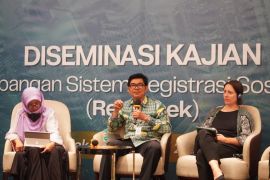"The government`s plan to increase tax on imported consumer goods is a good plan. We are convinced it will have a beneficial impact if properly implemented," BI governor said.Jakarta (ANTARA News) - The Indonesian central bank, Bank Indonesia (BI), has welcomed the governments plan to increase the tax on imported consumer goods in an effort to reduce the countrys current account deficit.
"I hail the plan as it is in line with the August economic package under which luxury goods or inessential goods for current activities are subject to additional taxes or import duties," BI Governor Agus Martowardojo said on the sidelines of the Global Entrepreneurship Week (GEW), which started here on Wednesday.
According to Article 22 of the Income Tax Regulation, duties on goods imported by importers with API (importer identification numbers) will be subject to a 2.5 percent tax on the import value of the goods. Goods imported by importers with no API will, however, be required to pay a tax of 7.5 percent on the import value or 7.5 percent of the value of the goods if auctioned.
"The governments plan to increase tax on imported consumer goods is a good plan. We are convinced it will have a beneficial impact if properly implemented," the BI governor added.
Agus said other measures should also be taken on a national scale to control exports and boost exports to improve the health of the Indonesian economy.
Meanwhile, Finance Minister Chatib Basri said on Monday that the increase in sales tax on imports would not negatively affect the financial performance of companies or states.
"State receipts will not disappear. Companies can pay in instalments. The effect on cash flow will occur only during actual payment," the minister added.
Chatib said the increase in tax would force companies to think twice before importing goods.
If a company does, however, choose to import, it will be permitted to pay tax in instalments. This will not affect the variable costs of companies.
"The company will pay the same amount of tax but in instalments. So, it will have funds to pay the salaries of workers and others. As long as the company can make variable cost payments, it will not shut down. However, fixed costs are likely to be affected because of reduced imports," the minister added.
The minister said the planned tax would be included in the governments second economic package to reduce the countrys current account deficit, which is likely to be announced soon. The tax will be imposed on certain types of imported consumer goods.
"If tax on imports is raised, companies will pay more for imports, so their cash flow will be affected, especially since they have to pay salaries to workers," he added.
The government also plans to extend the deadline to claim tax relief for employers who have decided not to fire any workers.
So far, about 70 labor-intensive companies have submitted applications for obtaining the tax relief.
The tax relief is part of the first economic package announced by the government in August.
Earlier, the deadline for claiming the tax relief was the end of December 2013.
Export oriented companies could claim a 50 percent reduction in tax, while non-export oriented but labor-intensive companies committed to not laying off workers could claim tax relief of 25 percent.(*)
Editor: Heru Purwanto
Copyright © ANTARA 2013











